During my first tour of duty as a young missionary in South Africa in 1968-1971, my first area of service was in the city of Pietermaritzburg which is about six hours southeast of Johannesburg (about 490 kilometer – 304 miles). I served in this area for a little over five months. The Ball family was in the branch of the Church at the time. Brother and Sister Ball took me under their wing primarily because I had become good friends with their teenage son and daughter – Chummy and Jenny Ball, who were 14 and 17 years of age at the time.
After being transferred from the Pietermaritzburg, I continued to keep in touch with Jenny Ball during the remainder of my mission and even after I return home to the US. We kept in contact for decades. First, through snail mail letters and then via e-mail. About ten years ago, the e-mail address I had for Jenny, which was a governmental work e-mail address, stopped working. I assumed that she retired and no longer used her work email address. Since I didn’t have her phone number, address, or any other way to contact Jenny, our communications stopped.
After arriving in South Africa, for some reason it never crossed my mind that I could reach out and find out if Jenny still lived in Pietermaritzburg or was even still living – which at my age is not always a given.
A couple of weeks ago, while sitting in my office, I had a flash of realization that I could probably walk up to the membership department in the area office and ask if they could help me locate a member of the Church living in South Africa. I got up from my desk and walked down the hall, up two flights of stairs, over to the cubicles where the membership group was located and ask if they could help me find a member of the Church living somewhere in South Africa?
They said they could and within a few minutes, I had Jenny’s email address, physical address, and phone number. A few days later while sitting in our apartment after eating a gourmet dinner my wife had prepared, I dialed Jenny’s phone number and low and behold….I heard the unmistakable South African English accent as Jenny answered her phone.
For the next 15 or 20 minutes, we talked about her life since I left South Africa in the early 1970s, her kids, and her grandkids. I learned that the following week her eldest grandson was entering the Mission Training Center (MTC) in Johannesburg to begin his missionary service in Pretoria, South Africa.
I also learned that her daughter’s husband, an orthopedic surgeon who also lived in South Africa, has been called to serve as a mission leader in the Gilbert, Arizona mission and leaves in June 2025 for his three years service as a mission leader in AZ. This means that we will likely see visit when we visit our youngest daughter Lindsay who lives in Gilbert, AZ. Jenny’s grandson will be joining them in AZ when he finishes his mission in Pretoria, South Africa in two years. He plans on attending Arizona State (in Tempe, AZ) and then BYU – Provo.
I told Jenny that we’re going to make a special effort to get to Pietermaritzburg in the next few months to see her before we end our missionary service in South Africa.
A few days ago, we drove over to the Johannesburg MTC and had a brief visit with Elder deWit – Jenny’s son. I continue to be amazed at how small the community of the Church can be. As we sat talking to Elder deWit during lunch, I thought of how I had known his great-grandfather, befriended his grandmother, and that his parents will be living within a few miles of our daughter Lindsay in AZ in a few months,. I thought how we have now established a new relationship with Jenny’s grandson – a missionary in the Johannesburg MTC.
Continuing this theme of the church community being relatively small, after we arrived in South Africa, we met a senior couple who are serving their senior mission here in Johannesburg who live in the same neighborhood in Orem, Utah where two senior couples that we served with in the Philippines.
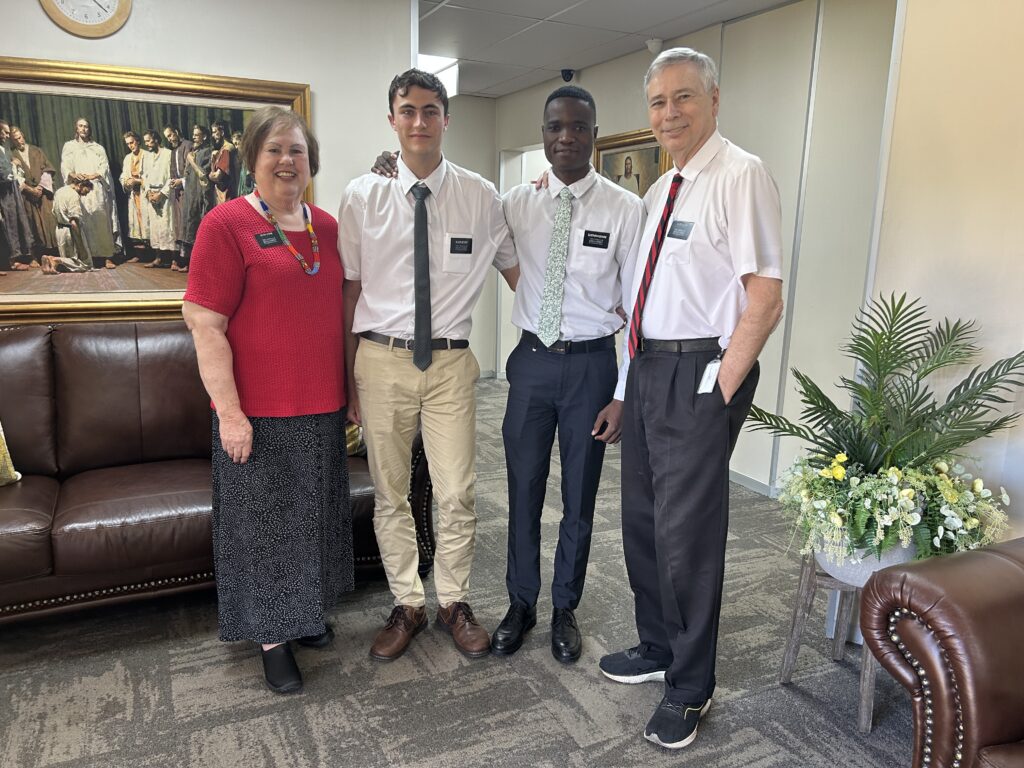
Marcia Storm, Elders deWit and Mkandawire, and Marvin Storm at the Johannesburg MTC
Native African Names
It has taken me some time to begin to master the names of native Africans. For example, one of Elder deWit’s companions is from Johannesburg, South Africa MTC and will be serving his mission in Zambia has a name that is not easy to pronounce – as you can see from his missionary name tag….just try and pronounce it.
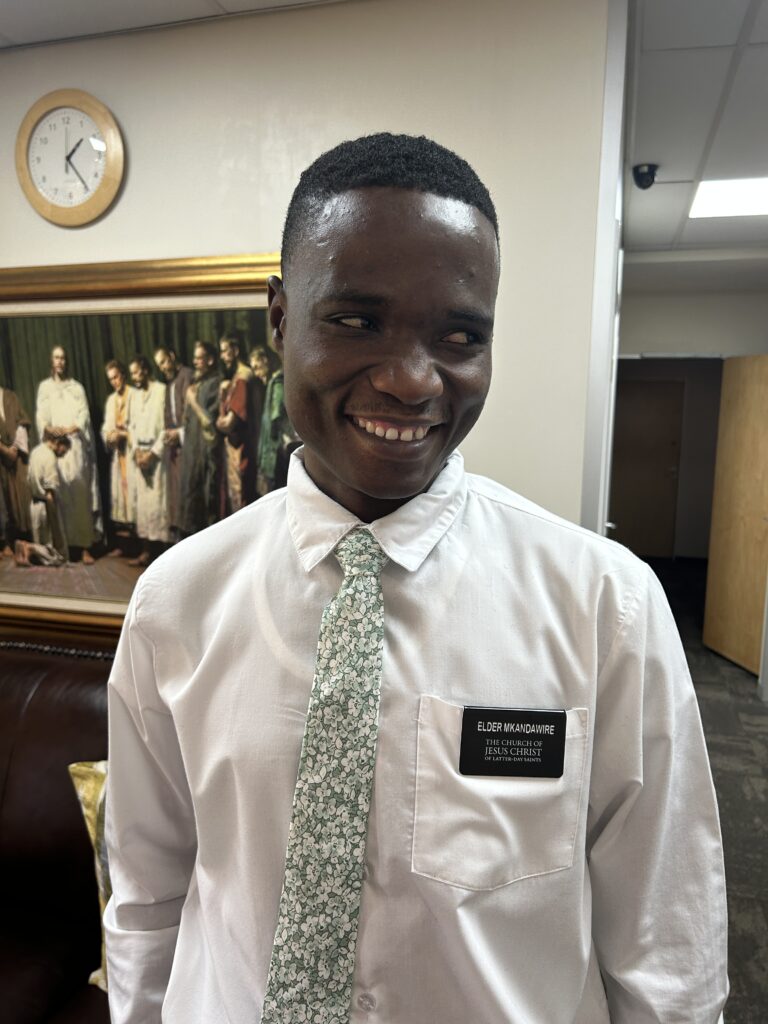
Elder Mkandewire who will be serving in Zambia for the next two year.
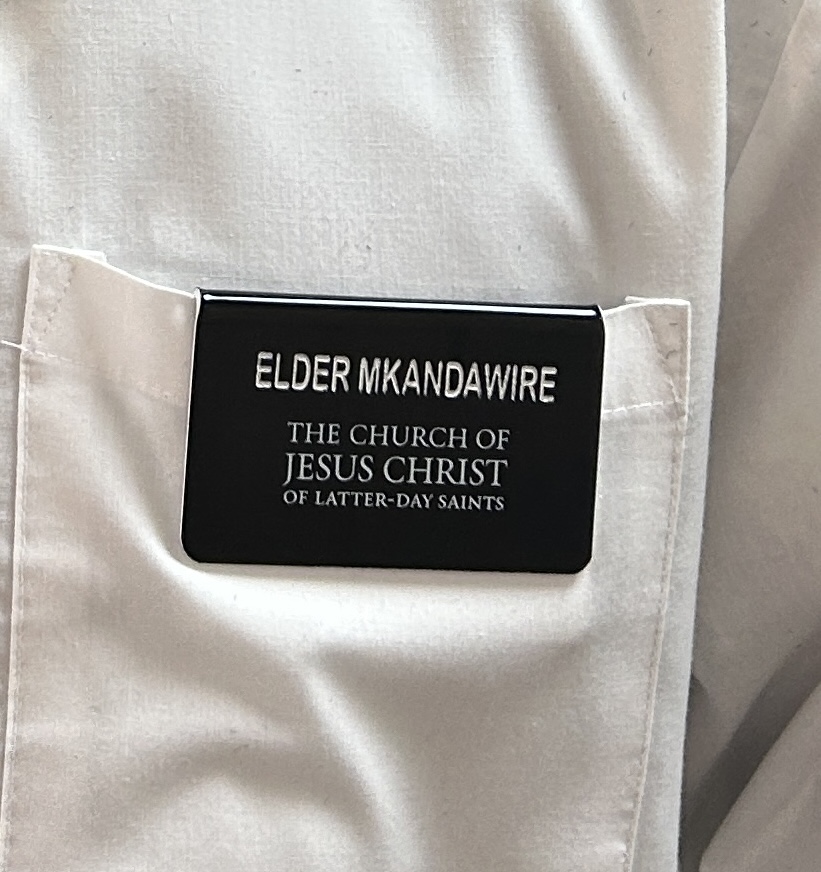
Yet Another Connection
During lunch with Elder deWit (Jenny’s grandson), as we sat at a table – lo and behold sitting at the same table was a Filipino missionary from Northern Luzon in the Philippines. I got out my Google Maps and he showed me where he lived in Luzon – the main and largest island of the Philippines and the island where Manila is located.
Although we had not been to his small town – a very rural community, we had visited an area very near to where he lived and grew up. He had joined the Church little over a year ago and is the only member of the Church in his family – which is not all the uncommon here and as well as in the Philippines. Elder de Wit’s companion Elder Mkandawire’s parents are also not members of the Church. He was introduced to the gospel by his brother a few years ago.
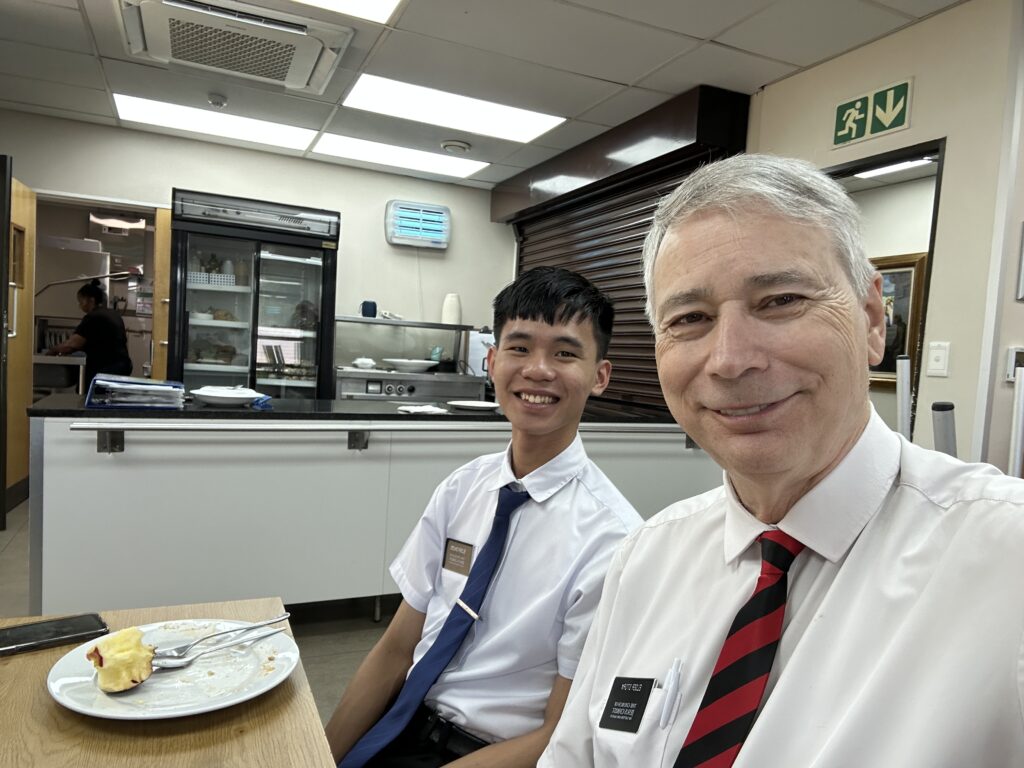
A Filipino missionary called to serve in South Africa.
While serving in the Philippines, I was amazed at how many missionaries that we met in the Manila MTC were from Africa. It was inspiring to be at the Johannesburg MTC and to meet a Filipino missionary that has been called to serve in South Africa.
As we left the MTC, I couldn’t help but reflect on the benefits that all of this cross-pollination among young missionaries will have on the lives of these young missionaries as they gain valuable experience and the enormous impact this experience will have on the future leadership in the Church in their world countries and around the world.
In my opinion, there is no better training for life, career, marriage, and leadership than a mission because this is where these young missionaries learn to live and work with people in different countries, with different customs, from all different social strata, and how this will impact their our look on life.
Also, I marvel at how these young people who have spent time in another country, away from home, and doing the Lord’s work every day for two years, and how they do all of this with very little training. Yet, they managed to figure thing out on their own even though nearly all of these 70,000+ 18 to 20- year-old missionaries are only six years out of primary, if they even went to primary at all.
It’s amazing that the missionary program works at all and while there are issues from time to time – I’ve concluded that if this work weren’t true, the missionaries would have destroyed the Church a long time ago.
Other Connections
We had a senior couple’s luncheon devotional a few weeks ago and President Kingsley, the Johannesburg Temple President, was the featured speaker. Prior to him speaking, I was sitting next to him and he looked over at my name missionary tag and asked me if I had served a mission in South Africa as a young man. I told him I had and he said he remembered me – because who can forget a surname like “Storm.”
He told me that we had met on his first day of his mission in the Johannesburg Mission Home. At the time, I was serving as an assistant to the mission president and was tasked with orienting all new missionaries to missionary life. I would have never recognized him but he said he had never forgotten me – I was afraid to ask him if his remembrances of me was a good or bad thing.
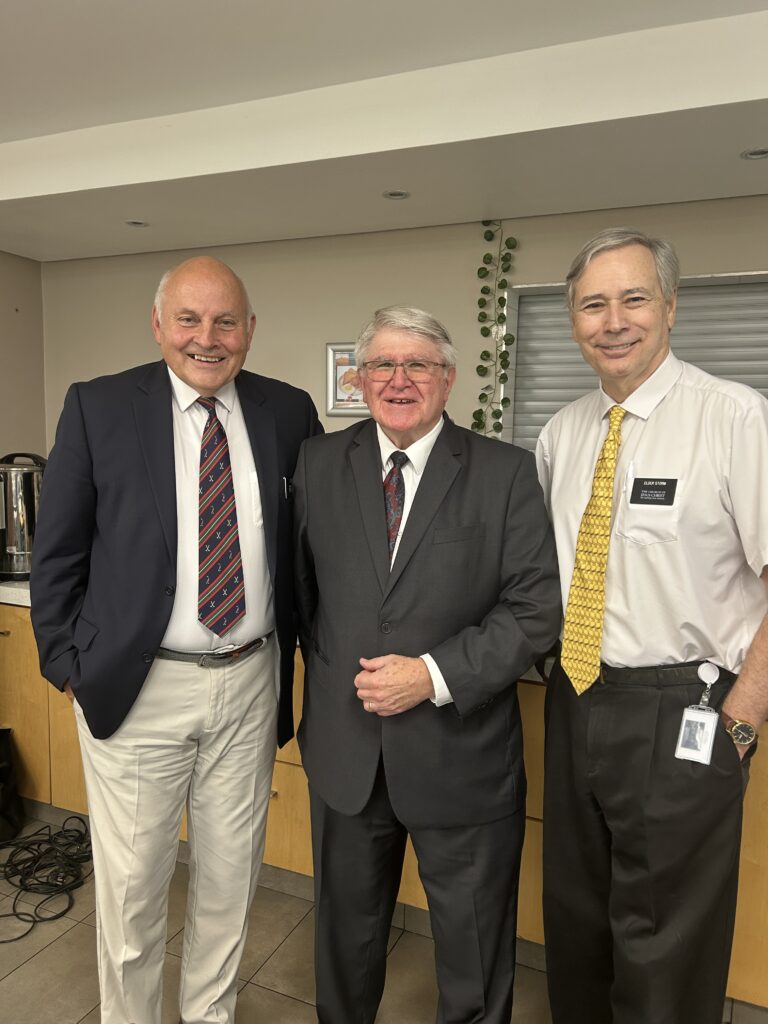
In the above picture, Greg Gollaher (on the left) was one of my missionary companions in Salisbury, Rhodesia (now Harare, Zimbabwe in 1969 – 1970). Greg is serving senior mission in South Africa with his wife. The man in the middle is President Kingsley from South Africa and of course, I am on the right.
What I continue to learn about the Africa South Area during out time here….
We love it here in South Africa, although it does have its challenges. Here are a few highlights from an article in the local newspaper:
President Cyril Ramaphosa (the president of South Africa) while campaigning promised South African bullet trains and smart cities. Instead, we got power cuts, water outages, and trains that could not run because the railroad tracks were stolen.
The comment in the news article that mentioned trains was enlightening for me. When I served my first mission here, one of the major modes of transportation was trains. We took trains all of the time to get around. Yet, today there are very few trains operating – a fact has been confirmed by others that we have talked to who are native South Africans.
Another challenge living here are the routine electrical brown outs, which is called loadsharing. There is a cell phone app for Eskom, the utility company, that provides a schedule for loadsharing. For example, today there are three separate brown outs where loadsharing cuts off the electricity – the loadsharing schedule for today is: 2:00 am – 4:30 am, 12:00 pm – 2:30 pm, 10:00 pm -12:30 am with no electricity. To say this is inconvenient is an understatement. When I was here during my first mission, this never happened. Those that we talk to indicated situations like this are primarily caused by politics.
However, all of this is not deterring the growth the Church is experiencing hyper-growth in the Africa South Area – which includes 13 countries. This growth creates some real challenges for the Church’s area leadership. Currently, there are 47 stakes in the 13 countries in the Africa South Area and there are barely enough meetinghouses to accommodate the current membership.
In the next three years, membership and the number of stakes is expected to double – and this is in just three years. This creates a huge challenge to find property and build meetinghouses where the membership can worship. I’m glad I don’t work in the real estate department in the area office. We’ve talked to several senior missionaries that are attorneys serving missions here in the legal department and are involved in reviewing land purchase agreements and contracts for building meetinghouse. They share how difficult it is to find property and get the necessary clearances and permits to build in the different countries not to mention the challenges in finding qualified contractors.
Like in the Philippines, there are enormous economic challenges here, but the people made our experience unforgettable. The same is proofing to be true here in South Africa as well.
Scripture of the day: Doctrine and Covenants 82:10 – I, the Lord, am bound when ye do what I say; but when ye do not what I say, ye have no promise.
Thought for the day: Facing challenges is not necessarily a bad thing. In Italy, during middle ages for the 30 years under the Borgias’ leadership they were wars, terror, murder and bloodshed, but this produced Michelangelo, Leonardo da Vinci, and the Renaissance. In Switzerland they had brotherly love and five-hundred years of democracy and peace, and what did that produce? The cuckoo clock. Challenges aren’t always a bad thing.
